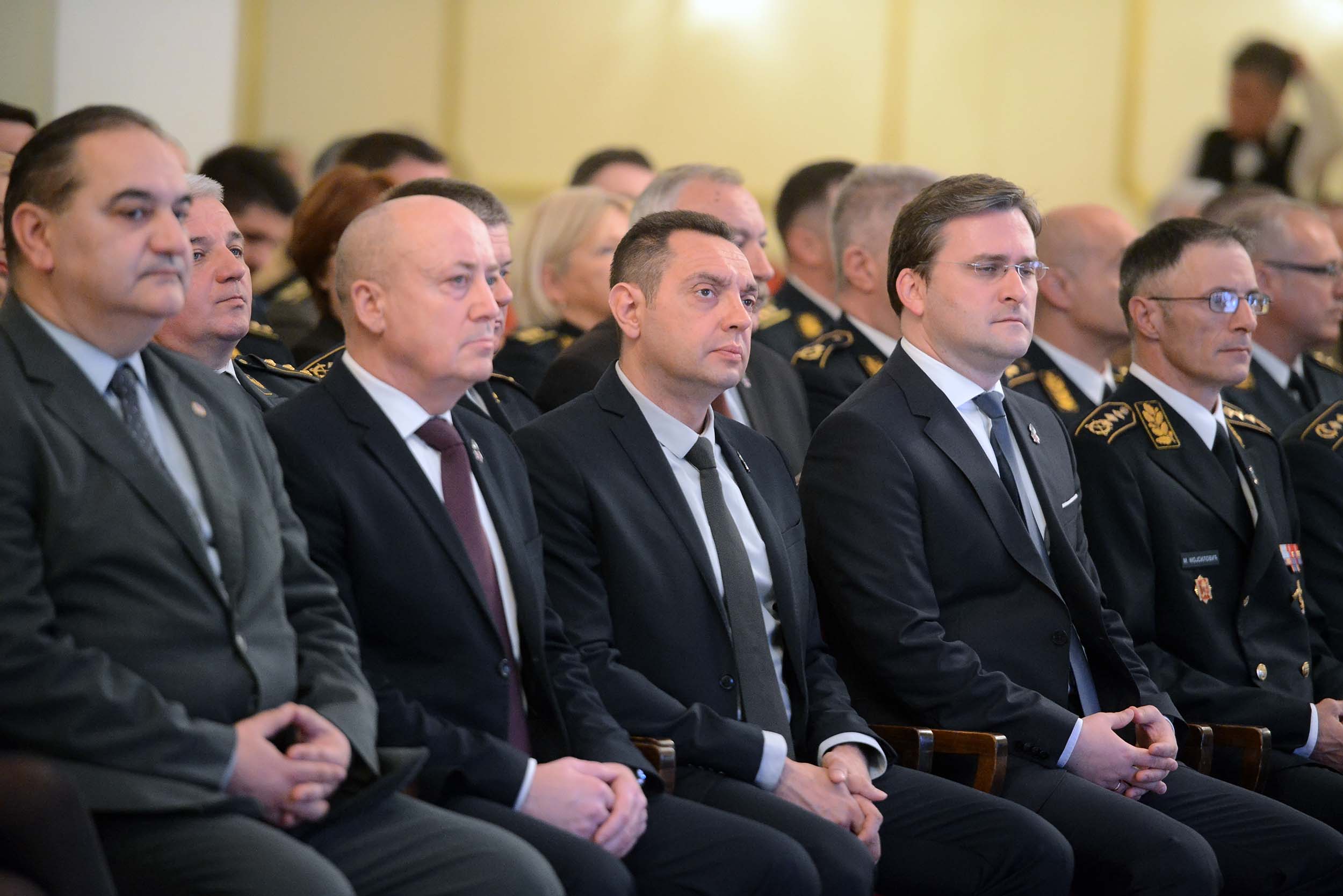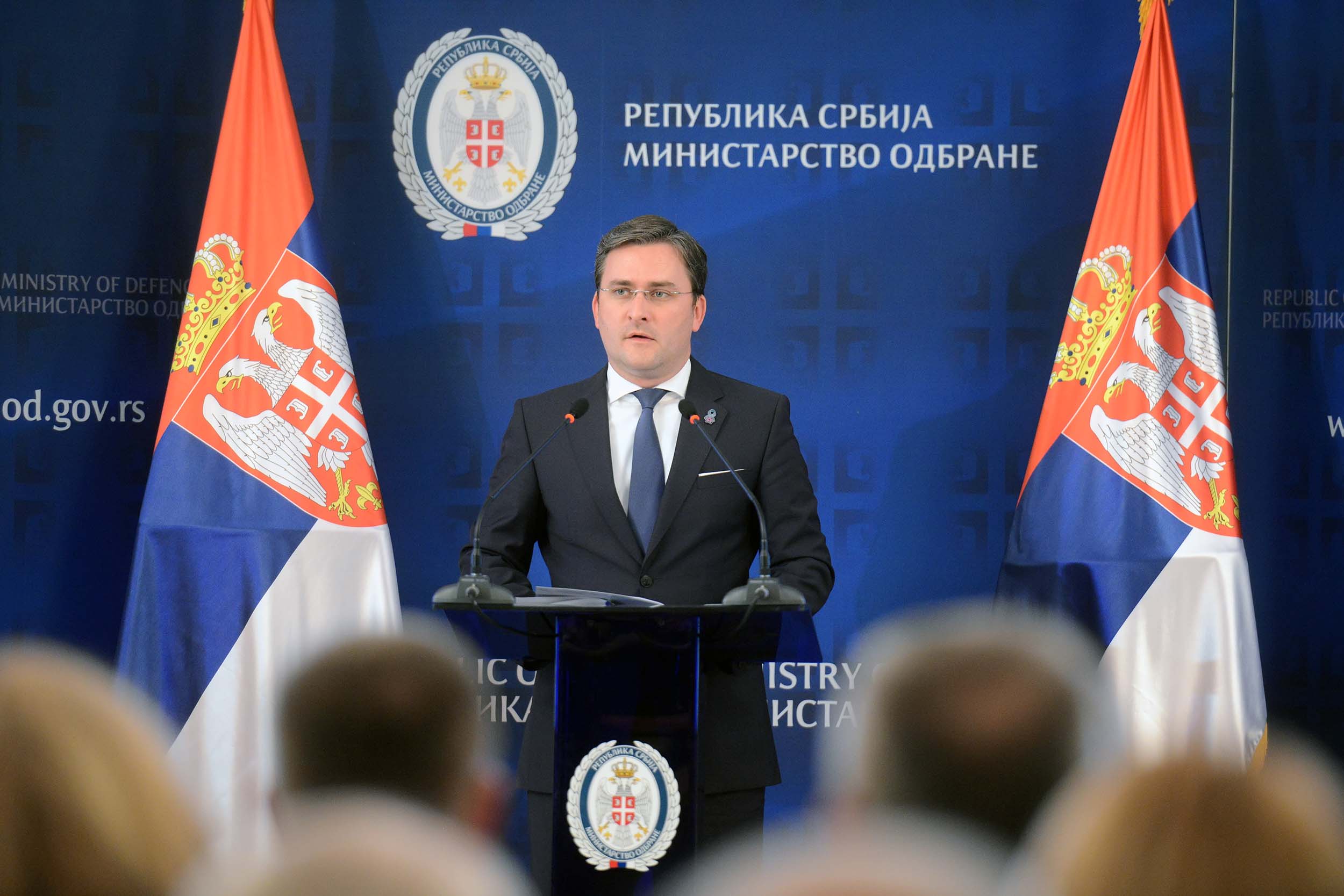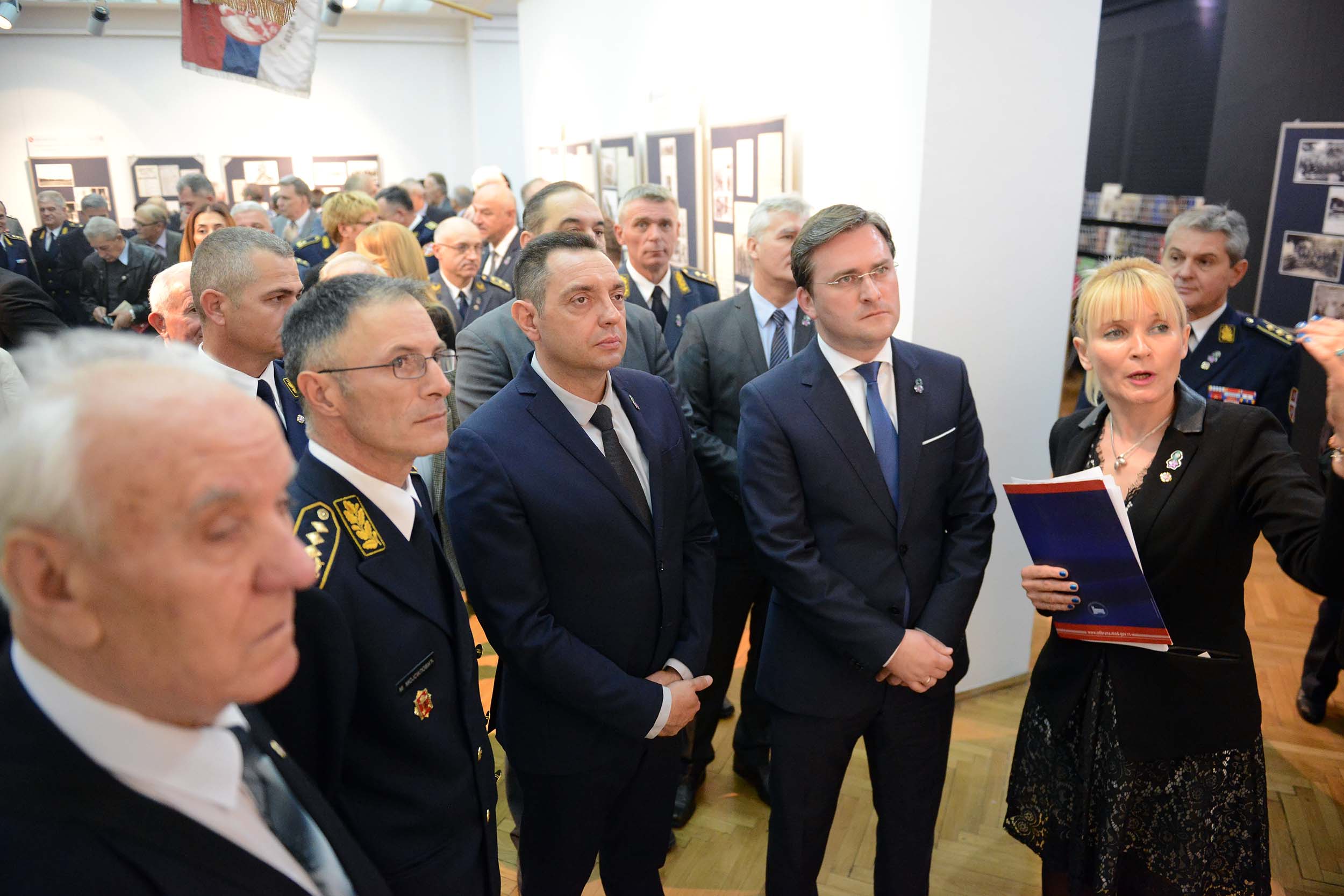11.11.2018.
Commemorative ceremonies on the occasion of a century since the victory in the Great War
The centenary of the victory in the World War I has been marked today with a commemorative ceremony at the Central Military Club by the presentation of the monograph “Memorial rooms as mirrors of history and tradition 1804-1918”, the documentary film of the same name and the opening of the exhibition “Serbia in the Great War”. The ceremony was attended by Envoy of the President of the Republic of Serbia, Nikola Selaković, Defence Minister Aleksandar Vulin, Lieutenant General Milan Mojsilović, Chief of General Staff of the Serbian Armed Forces, members of the college of the minister of defence and chief of General Staff, high military officials, representatives of religious communities and representatives of cultural and public life.
 Secretary General of the President of the Republic of Serbia, Nikola Selaković, opening the exhibition “Serbia in the Great War”, welcomed those present on behalf of the President and Supreme Commander of the Serbian Armed Forces, Aleksandar Vučić, stressing that today's event, the celebration of the ending and marking the victory in the Great War, is an act rounding off the centenary of the greatest suffering of our people and the state.
Secretary General of the President of the Republic of Serbia, Nikola Selaković, opening the exhibition “Serbia in the Great War”, welcomed those present on behalf of the President and Supreme Commander of the Serbian Armed Forces, Aleksandar Vučić, stressing that today's event, the celebration of the ending and marking the victory in the Great War, is an act rounding off the centenary of the greatest suffering of our people and the state.- After so many stories told over the past four years, and especially this year, it might be superfluous to recall the historical facts, 28th July 1914, when Serbia was wrongly accused before the whole world that it was the cause and the reason for the outbreak of the greatest war in the history of the world until that time, and then Cer, the Drina River, Mačkov kamen, Kolubara and all those places of mass killings, great and heroic victories of the famous Serbian Army. What I think we have not spoken enough about, and what should be the most important message for the people today and in the future, when we are speaking about the Great War and the glorious epic also of the recent Serbian history, it is that during the Great War, everything that was the best, the most quality and the brightest that the Serbian soul had ever had in itself, came out of a Serbian man, Selaković said.
Selaković reminded of the honourable feats of Serbian officers like Major Svetomir Đukić, whose knightly gesture is mentioned in the documentary film “Memorial rooms as mirrors of history and tradition 1804-1918” as well as the humanity of the famous painter Nadežda Petrović who lost her life nurturing the wounded suffering from typhoid disease.
- It is not mentioned there, but it can be seen in the picture, the heroism of the renown and famous Colonel Milivoje Stojanović-Brka, the legendary commander of the Iron Regiment, who went to the end, not allowing anyone else to go in front of his officers, non-commissioned officers and soldiers. As such, he lost his life in battle. The famous Binički raised him to heavenly heights devoting “Marsh to the Drina” to him There is the incredible, insistent to insanity, heroism of Vojvoda Vuk, and the sentence “Grunište will be ours, even if we all have to leave our bones here”. He left them. But that is something we have been silent about for a long time. I will remind you that it is 11th November 2018 today. Serbia celebrates the centenary of the great victory with its allies. But on 11th November 1968, the celebration of this day was prohibited in Serbia. The only ones who were courageous enough at that time, led by academician Vasa Čubrilović, to organize the celebration of the 50th anniversary of the victory of the Serbian Army in World War I, were prohibited to do that by the leadership of the then Yugoslav state. That is the reason why it is very praiseworthy and honourable for us and our generation and our Ministry of Defence and the Serbian Armed Forces to celebrate this day, and not only this day, but we were marking it in all the previous four years in the way that this occasion deserves, the envoy of the president said.
 Selaković underlined that even the smallest shadow was not cast on the deeds of the Serbian soldier during the World War I, because if it was, our enemies would not have missed to remind us of that.
Selaković underlined that even the smallest shadow was not cast on the deeds of the Serbian soldier during the World War I, because if it was, our enemies would not have missed to remind us of that.He pointed out that in addition to the fact that at the time Serbia did not only have the best soldiers and paramedics, but it won the victory because it had the best supreme commander Regent Aleksandar Karadjordjević.
- Perhaps this injustice, which was created against these anniversaries in some previous period, against these great events, against perhaps the greatest days of Serbian history in general, and not only its recent times, was personified in the injustice shown against the Regent Aleksandar, the man who impressed the whole world by the example of the supreme commander who shared the fate of his people for the sake of his army and each of his soldiers, from the beginning to the end of the war. I am convinced that the time has come when we will be able to show a kind of debt to that high personality of our history, Nikola Selaković emphasized.
He reminded that the withdrawal of the complete army and the state apparatus with a part of the population through Albania is a unique example in history and that the highest official who remained in Serbia during the occupation from 1915 to 1918 was the Secretary of the Red Cross.
- Even if someone wanted capitulation, there was no one to sign, Selaković underlined, adding that perhaps the most valuable feature that our people showed at that time was the unity and parliamentarity.
The project, which included the Monograph, the documentary film and the Exhibition on the occasion of the centenary of the victory in the Great War, was realized by the Department for Tradition, Standard and Veterans of the Human Resources Sector in cooperation with Odbrana Media Centre of the Public Relations Department, Military Archives and the Historical Archives of Požarevac. Monograph “Memorial rooms as mirrors of history and tradition 1804-1918” is the fruit of a dedicated one-year-long work of an impressive number of experts in the fields of historiography, museology, archival science, history of art and culture.
State Secretary Aleksandar Živković, who spoke on behalf of the Editorial Board of the Monograph, said that we had gathered here to listen, compare and check how much we really did for the great and difficult victories of the Serbian Army won in that war not to be forgotten but to be preserved and transmitted to future generations, as part of the culture of memory, but also as a building material of national identity.
- The series of 34 memorial rooms shown is a small part of the tradition of the Serbian people, and this monograph is only the first stage in this significant venture of memory renewal, with a focus on Serbian military history with the World War I, inclusive. The goal of the entire project is the comprehensive and essential connection of the Serbian Army with its rich and glorious history. In accordance with historical facts, each unit and institution of the Serbian Armed Forces inherits, preserves and nurtures the traditions of their respective elements of the Serbian army from different periods of Serbian military history. In this first step, the monograph connects us with the tradition of the Serbian Army. At the end of it, a proposal was given for the normative arrangement of the holders of the traditions in the commands, units and institutions of the Army of the Kingdom of Serbia from the time of the World War I, which, of course, needs to be further connected and upgraded. Richly illustrated with documents and photographs of items from that period, it represents a picturesque historical retrospective of Serbian military traditions, not only for the professional members of the Serbian Armed Forces and the Ministry of Defence, but also a wider audience, Živković said.
He added that few nations were always on the right side of history, on the side of justice and good, and even fewer nations who, with their great sacrifice, were written in all capital letters in the world history.
 - At the time of the celebration of the century that has passed since the Great War, we recall important personalities, crucial battles and great victories. Serbian soldiers who have shouldered the burden of these crucial historical moments must not be forgotten; they have written the most sacred and brightest pages of the Serbian military history for years. We are deeply aware of the fact that only those who know and respect their past can can define themselves in the present and plan for the future. Therefore, the initiation of the reconstruction of the culture of memory through the presentation of the memorial rooms in the Ministry of Defence and the Serbian Armed Forces, as a contribution of the bearers of this culture, was the basic idea in the preparation of the Monograph, Živković said.
- At the time of the celebration of the century that has passed since the Great War, we recall important personalities, crucial battles and great victories. Serbian soldiers who have shouldered the burden of these crucial historical moments must not be forgotten; they have written the most sacred and brightest pages of the Serbian military history for years. We are deeply aware of the fact that only those who know and respect their past can can define themselves in the present and plan for the future. Therefore, the initiation of the reconstruction of the culture of memory through the presentation of the memorial rooms in the Ministry of Defence and the Serbian Armed Forces, as a contribution of the bearers of this culture, was the basic idea in the preparation of the Monograph, Živković said.He emphasized that in a long series of Serbian military traditions, the most important place belongs to the period between 1804 and 1918.
- In that period, the Serbian state was born again, as well as its armed forces that will be able to accomplish all tasks set before it in the field of national liberation, from the struggle for the state independence to the victorious wars of 1912-1918. This is why we are presenting the monograph “Memorial rooms as mirrors of history and tradition 1804-1918” in the year of marking the end of the World War I, the State Secretary said.
Within the artistic part of the programme, two compositions by Nebojša Mastilović “Help of the Holy Tsar Nikolai” and “On the Angelic Wings of Victory” were performed, while the Mixed Choir of the Ministry of Defence and the Serbian Armed Forces sang the song "Oj Srbijo, mila mati" (Oh Serbia, dear mother!).
 PHOTOGALLERY
PHOTOGALLERY VIDEOGALLERY
VIDEOGALLERY
 mp4
mp4 